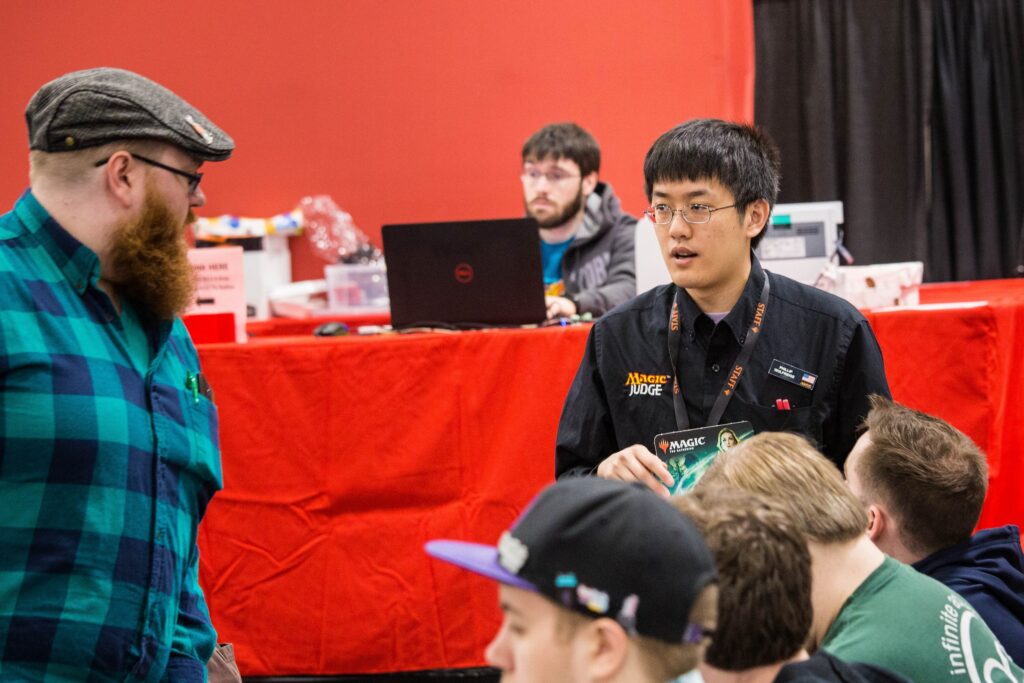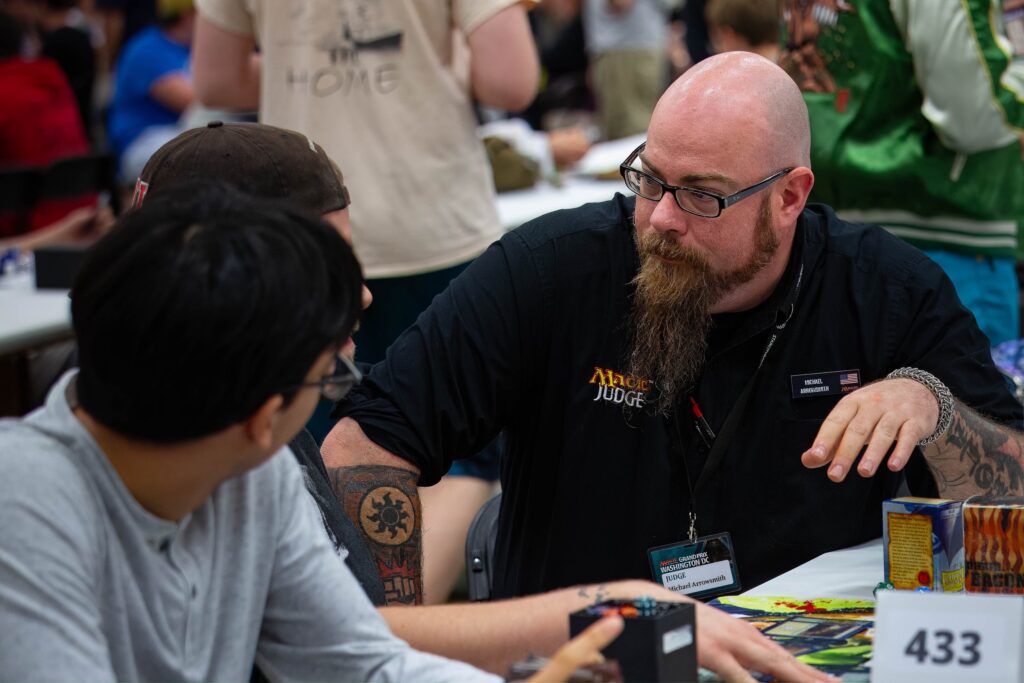The introduction of new level definitions continues this week with the presentation of Judge Foundry Level Two. We received a ton of great feedback on L1 last week, and it has already made an impact. Please continue to send that our way on JudgeApps, Reddit, Facebook, Twitter or via email.

Description
Level Two Judges are more commonly found at large and competitive events. A Level Two Judge knows the basics of competitive tournament policy and runs small in-store competitive tournaments on their own. L2s certify judge candidates for L1 in their home store or local area to ensure that the local judge community continues to flourish. At a large event, many L2s will be answering judge calls on the floor of competitive events.
An L2 should start looking towards L3 when they are comfortable with Competitive REL. For some, this will mean when they are regularly head judging in-store competitive events with two or more floor judges. For others, it will mean they have attended several large events and are familiar with the tasks expected of a floor judge of an event with teams.
Advancement
Candidates for Level Two need to show a higher level of skill, knowledge, and involvement than is expected for Level One Judges. The tasks for L2 will generally be completed at competitive events like RCQs at local game stores, but some candidates working at large events will also complete their requirements there. The exams are the final step in the advancement process. Other than that, these requirements don’t need to be finished in order, but they are presented in a rough order in which a candidate might commonly experience them.
To be promoted to Level Two, a candidate must complete the following requirements
1. Write a review of another judge from an event where both judges worked. The review must contain detailed and actionable feedback.
One of Judge Foundry’s core values is feedback, and the beginning of the L2 advancement process is where judges need to demonstrate their ability to give feedback to their peers. This review doesn’t need to be extensive (think 200 to 400 words), but it should identify some strengths and weaknesses of the reviewed judge and actionable feedback for any areas of improvement. This is an example of a good review.
2. Under the supervision of an L2+, work at least two Competitive REL events
A candidate needs to work some Competitive REL events, and will need a recommendation review, so those need to be observed by a Judge Foundry L2. This doesn’t mean the L2 or the candidate needs to be the head judge, or even run the event, the L2 needs to be present at the event with the candidate to observe and provide feedback. These events need not have the same L2+ supervisor.
3. Receive a recommendation review from an L2+, evaluating at minimum the following qualities and affirming that the candidate is ready for Level Two:
-
- Technical performance at an event
- Confidence in giving a ruling
- Details of one policy related discussion from the event
- Player engagement
- Ability to perform a deck check
- Technical performance at an event
Each required item in the recommendation doesn’t need to come from the same event. L2s have a baseline of competitive REL skills, including giving rulings in a competitive setting, talking about tournament policy, and deck checks. Even though they aren’t certifying the candidate for L2, the mentor providing the recommendation should express that the candidate has met the requirements, and how they have done so.
4. Pass an interview with an L3+ Judge including at a minimum the following evaluated items:
The candidate’s mentor should help them find an L3+ judge to complete the interview. The interview need not be done in person, but if possible, finding a way to do so is recommended. If the candidate or mentor can’t find an appropriate interviewer they can reach out to Judge Foundry for assistance. The community highly values certifying judges for L2, so JF leadership is motivated to provide as much assistance in facilitating interviews as it can.
-
- Choose one
- Choose one
-
-
- Understanding of the teams that may be used at a large competitive REL event
- Understanding of the responsibilities of a head judge at a local competitive REL Event
-
Some candidates will be more familiar with RCQs run at stores, but some will have worked more at large events. Understanding of one of these two experiences should be covered.
-
- Understanding of the philosophy differences between penalties (Warning, Game Loss, etc)
Judges answering calls at Competitive REL need a base understanding of why we give out penalties.
-
- Understanding of how to turn over a round
One of the core tasks than an L2 may be asked to do is run a tournament on their own. Ending a round and starting the next one isn’t as simple as just pressing a button, so the candidate should have some understanding of what else goes on.
-
- Ability to distinguish between Unsporting Conduct situations (USC-Major vs USC-Minor vs no penalty)
Sometimes less-sporting conduct occurs at tournaments. L2s should understand the difference between what USC-Minor and USC-Major are, and how to respond to them if needed.
-
- Results of reflections from their recommendation review
Self-evaluation is an important skill, and new L2s should show the ability to receive feedback and identify some path forward to improvement. The candidate should share their recommendation review with their evaluating L3+ at least a week in advance to help them prepare for the interview.
-
- Understanding of how to certify a judge for L1
L2s grow the judge community by mentoring and certifying L1s. Their mentor should teach them the ropes, and L3s doing L2 advancement interviews should verify that a new L2 understands the requirements for L1 so that the candidate has consistent standards for a new judge.
5. Pass both the Level Two Rules exam and the Level Two Policy exam with scores of 80 or better, within a 2 month period.
The Level Two Rules and Level Two Policy exams together comprise the last step to obtain Level Two. The exams can be administered at the same time or separately – it’s up to the candidate, but they need to be passed within 2 months of each other. The community is developing testing standards and requirements, and Judge Foundry expects robust discussion among the L3 community about expectations and accommodations for Level Two testing.

Maintenance
Maintenance requirements for Level Two Judges are slightly higher than what we expect of their Level One peers. Since Level Two is the gateway to Competitive REL, these requirements demonstrate to Tournament Organizers that L2s they hire remain conversant in competitive policy.
To maintain the Level Two certification, a judge must complete the following items each year
1. Choose one —
- Pass the annual L2/L3 rules refresh exam
- Pass three out of four set update quizzes throughout the year
L2s have two options for rules knowledge testing. Update quizzes published from time to time will ensure that they are up to date on new mechanics from new sets, as well as interactions common to competitive play. The update quizzes are not designed to be challenging, but to educate and ensure judges are staying current.
2. Pass the annual L2/L3 policy refresh exam
Tournament policy can often shift very quickly, sometimes drastically, so L2s are required to pass an annual policy update to ensure that they are familiar with changes.
3. Choose one —
- Work at least two competitive events
- Work at least six events
- Write or receive a short review about their involvement in events or the judging community
L2s need to remain involved in the community through working events, writing a review about themselves and their involvement in the community, or working with a mentor to have that review written about them.
4. Maintain membership in Judge Foundry by being up-to-date on their membership dues

Skills
Judge Foundry views Level Two as an indication to an organizer that the judge has certain skills and knowledge. The skills section re-frames the certification requirements in a way that organizers can understand what skills a judge will bring to an event.
As a certified Level Two Judge, a judge demonstrates the following proficiencies, in addition to the proficiencies of a Level One Judge:
- Knowledge
- Passed the Level Two rules exam, extensively covering comprehensive rules topics
- Passed the Level Two policy exam, covering the IPG and MTR
- Demonstrated the ability to discuss tournament policy
- Demonstrated understanding of the the philosophical differences between penalties (Warning, Game Loss, etc)
- Demonstrated the ability to distinguish between negative situations with players that result in no penalty, USC-Minor, and USC-Major.
- Event Skills
- Possessed experience judging competitive REL events
- Demonstrated ability to perform a deck check
- Demonstrated understanding of the teams at a large Competitive event, and/or head judging in-store competitive events.
- Demonstrated ability to explain the steps needed to turn over a round
- Demonstrated understanding of handling unsporting conduct situations
- Leadership Skills
- Provided written feedback to a peer to improve their performance at future events
- Demonstrated ability to explain the steps of judge certification and to conduct a certification interview
- Personal Skills
- Positively engaged with players and create a welcoming environment, even in a competitive setting
- Assessed penalties with confidence and without major stress or distress
- Recognized and handled minor Unsporting Conduct situations.
- Recognized and reflected on their own strengths and areas for improvement

Benefits
Judge levels each carry several benefits to the holder of the certification. Level Two Judges are the core providers of competitive judging at in-store events and the first mentors with whom most judges will work. They are provided additional access to contribute to Judge Foundry projects, can certify new judges and their skills are recognized by tournament organizers as being more advanced than the expectations for Level One Judges.
Certified Level Two Judges receive the following privileges as members of Judge Foundry
- Use of title Level Two Judge or Judge Foundry Level Two
- Access to private Judge Foundry resources, forums, and chats
- Ability to participate in Judge Foundry projects restricted to L2+
- Right to vote in Judge Foundry leadership elections (like all JF-certified judges)
- Ability to certify Level One Judges
